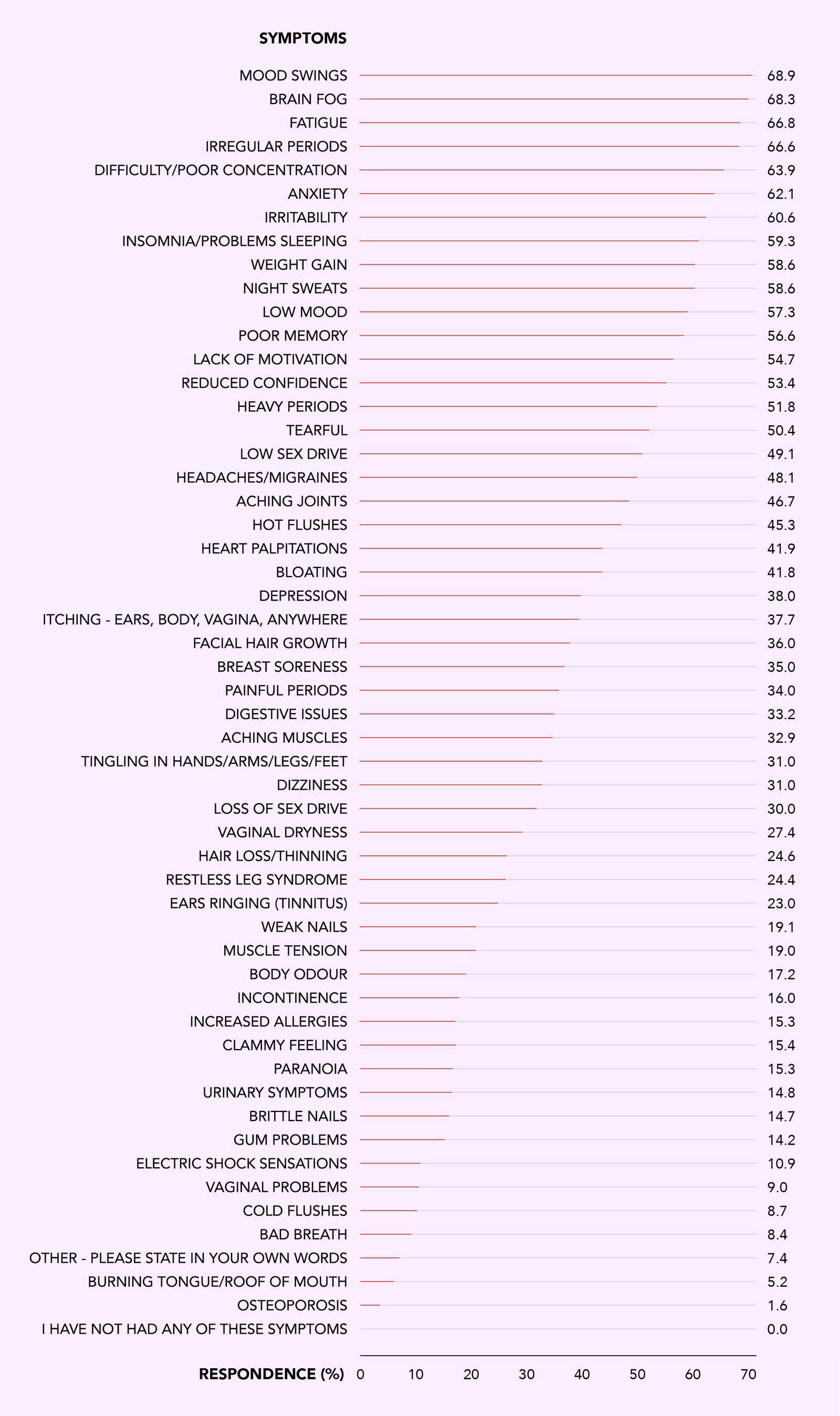Perimenopause Symptoms Explained: Is Your Body Playing Tricks on You?
Reading time 9 min

Reading time 9 min

One minute you’re sweating through a meeting, and the next, you can’t remember where you left your keys. You might experience symptoms like hot flashes, anxiety, or joint pain. Here’s perimenopause symptoms explained, so you can understand what’s happening to your body and feel less alone. In fact, you’re not alone – thousands of women are navigating these changes too!
What are common perimenopause symptoms?
Perimenopause symptoms include hot flashes, night sweats, mood swings, memory problems, joint pain, and bladder issues. Understanding these changes helps women prepare for the menopause transition.

A 2022 survey1 of nearly 1000 women aged 40 and older revealed that many experienced changes, some of which were surprising and even overwhelming. Recognizing these symptoms as part of perimenopause can help you feel less confused and more in control.
Vasomotor symptoms (VMS) are primarily hot flashes (a sudden feeling of intense warmth that usually starts in the face or chest and spreads through the body. It often comes with sweating and a racing heart and can last from 2 to 30 minutes) and night sweats. Hot flashes and night sweats are experienced by about 40-60% of perimenopausal women2, 3.
The list is long and includes brain fog, sleep problems, mood swings, memory issues, depression, and more6. They are the most underappreciated symptoms4. Doctors write them off as non-significant, and we sometimes blame ourselves for just not having it together5. We should not feel guilty, it’s just biology, baby! We can manage them by using different tools.
General physical symptoms include muscle and joint pain/stiffness, headaches, irregular periods, and weight gain7.
These are bothersome symptoms such as vaginal dryness, painful intercourse, loss of interest in sex, and trouble controlling your bladder8.
Take a look at the graph below. One thing that stands out is that 0% of women reported having no symptoms. Another surprising finding is that the top two symptoms aren’t the ones we typically associate with perimenopause or menopause, hot flashes, or night sweats. Instead, they are psychological: mood swings and brain fog. This transition affects every aspect of your biology: body, brain, and, you might say, your soul (unfortunately, there is no scientific proof of the latter 🙂).

I love it when research finally confirms what we’ve known all along: the symptoms we feel are real, and every woman (yes, I’m using the word every here!) goes through them in one form or another. But the gap that frustrates me most is how little attention the psychological and cognitive symptoms get, even from doctors. How often are these just brushed off with a prescription for an antidepressant or a half-hearted, “It’s probably just stress”?
We’ve all heard the dismissive ‘get a grip’ or, worse, ‘What happened to the old you?’ What’s missed here is that these aren’t just mood swings or fleeting thoughts; they’re part of a profound shift in our biology – it’s all biology, after all! We aren’t losing control; our bodies are evolving, adapting, and speaking to us in new ways. And it’s high time we see these symptoms as what they are: valid, real, and part of an important phase of life.
Dr. Jūra Lašas
1.
Harper, J. et al. An online survey of perimenopausal women to determine their attitudes and knowledge of the menopause. (2022) https://doi.org/10.1177/17455057221106890
2.
Thurston, R. et al. Vasomotor Symptoms and Menopause: Findings from the Study of Women’s Health across the Nation. (2011) https://doi.org/10.1016/j.ogc.2011.05.006
3.
Gold, E. et al. Longitudinal Analysis of the Association Between Vasomotor Symptoms and Race/Ethnicity Across the Menopausal Transition: Study of Women’s Health Across the Nation American Journal of Public Health. (2006) ttps://doi.org/10.2105/AJPH.2005.066936
4.
Constantine, G. et al. Behaviours and attitudes influencing treatment decisions for menopausal symptoms in five European countries. (2016) https://doi.org/10.1177/2053369116632439
5.
Williams, R. et al. Healthcare seeking and treatment for menopausal symptoms in the United States. (2007) https://doi.org/10.1016/j.maturitas.2007.09.006
6.
Badawy, Y. et al. The risk of depression in the menopausal stages: A systematic review and meta-analysis. (2024) https://doi.org/10.1016/j.jad.2024.04.041
7.
Delamater, L. et al. Management of the Perimenopause. (2018) https://doi.org/10.1097/GRF.0000000000000389
8.
Calleja-Agius, J. et al. The urogenital system and the menopause. (2015) https://doi.org/10.3109/13697137.2015.1078206